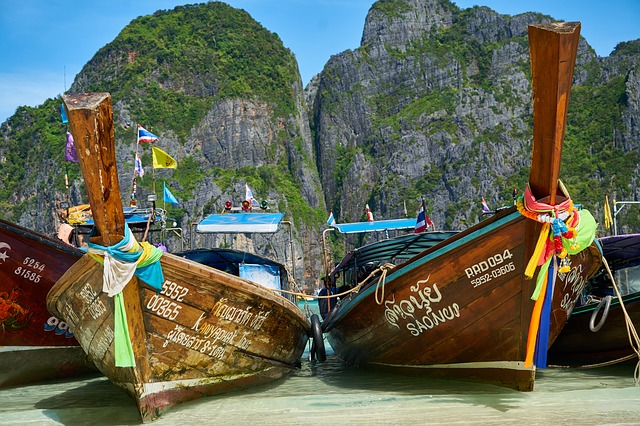Thailand is starting to see the collapse of its inbound travel agencies as a result of the coronavirus, including two well-known names, Asia World Enterprise and CBS Travel Asia, which closed down on July 23 and August 1, respectively, after two decades in operation.
What should have been a banner year celebrating the 60th anniversary of Thai tourism is instead the industry’s worst nightmare due to the pandemic. At the start of 2020, inbound agencies were in glee over the promise of 42 million foreign arrivals spending $77 billion. Now they are lucky if even eight million – an epic drop of 80 percent – can arrive in the kingdom in the next few months.
“Asia World has had no business for the past four to five months and no income because of Covid-19,” said founder and managing director, Stephen McEvoy, in a note to staff. “It seems that tourists will not return to Thailand for a long time, which could be in 2021 or 2022, but nobody can be sure.”
CBS Travel’s letter showed its struggle to prevent closure. It apologized to employees for a “prolonged response” due to efforts to find solutions. “Although there was a number of attempts to reach other funding solutions to keep the business alive, we never successfully reached the majority vote for such option,” said Siroj Ussamarn, chief financial officer and son of the agency’s founder, Chaladol Ussamarn.
Both Asia World and CBS Travel provided tours and ground-handling arrangements in Thailand and other key Southeast Asian destinations to leisure, meeting and incentive guests, particularly Europeans. Both founders did not reply to Skift’s request for an interview.
While their closure surprises no one, it’s a sober reminder that the gangrene that has set in on tourism will amputate not only inbound agencies, but a whole supply chain. Inbound agencies depend on overseas tour operators and conference organizers to bring in the clients, hotels depend on agencies to fill up the rooms, and on it goes.
“All those along the line of business are affected. This crisis spares no one,” said Sumate Sudasna, managing director, CDM (which stands for conference and destination management) Thailand.
Tourism businesses in South-east Asia, a region that relies heavily on international tourists, are fearing that if borders stay closed for too long, there won’t be much of the industry left. A pivot to fewer but higher quality tourists such as medical and luxury travelers, as Thailand is doing, won’t help the majority of its players who last year handled 39.8 million foreign arrivals.
Neither will governments’ scramble to promote staycations. The domestic market is only a third of tourism revenues in good times in a big country like Thailand with 70 million people; what more Singapore with not even seven million. Besides, it’s the rainy season from June to end-October in Thailand — why would locals want to head for the beach or outdoors?
DESTINATION SPECIALISTS
Inbound agencies, or “DMC” (destination management company) as they are known in Asia, set themselves apart from online travel agencies, ticketing agencies and volume flight-and-hotel operators by having deep destination knowledge and wide contacts to sew together unique itineraries that suit different market needs.
The sector kept growing. Even when old big names such as Thomas Cook or Kuoni failed, there were always new accounts – whether from emerging or traditional markets, whether small, medium or big – because Thailand was always an attractive sell.
Like everyone else in the Thai industry, inbound agencies’ survival depends on the country’s reopening strategies and how amply-funded they are to withstand the length it’ll take to see a return of tourists.
The kingdom ranks number one out of 184 countries in the world for its ongoing coronavirus recovery effort in Global Covid-19 Index published on July 28 . Yet, despite the poster child status, or because of it, Thailand is allowing only select groups of people in, with no clarity on what the conditions are.
A survey in July by the Thailand Authority of Tourism and Tourism Council of Thailand shows that most local Thais prefer strict restrictions for entry of foreign visitors and up to 2,000 people a day. In June, one of Thailand’s major attractions, Wat Po, a temple adjacent to the Grand Palace in Bangkok, barred entry to foreigners citing Covid-19 concerns.
“Thailand’s approach to the crisis is completely different from that of European countries. Travel within Europe has restarted quite well. European countries are trying to deal with the infections pragmatically and keep the numbers under control. Thailand and other Asian destinations have a ‘zero’ target. This needs total isolation – with unprecedented consequences,” said Ruth Landolt, general manager, Asia365. The tour operator, based in Zurich, is part of Germany’s DER Touristik, which has its own inbound agency in Thailand, Go Vacation.
“The demand for travel to Southeast Asia generally is there, but clients need to know that if they book now to travel in December there is at least 75 percent chance it is going to happen. I fully appreciate the health concerns within the countries but to me the economic consequences of a continued tourism lockdown are even more disastrous. I know domestic tourism has cashflow value but this is usually long weekends and at low season promotional rates. For hotels to be profitable they need to be operating at 80 percent each night throughout the high season.”
At the very least, neighboring countries such as Thailand, Myanmar, Laos, and Cambodia should restart overland travel, suggests Willem Neimeijer, founder of Khiri Travel and CEO of Yaana Ventures.


























